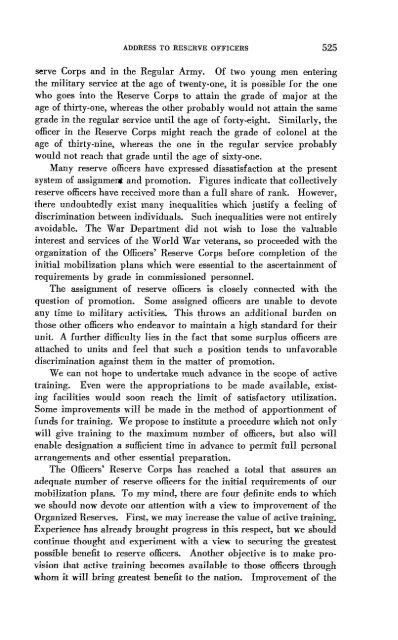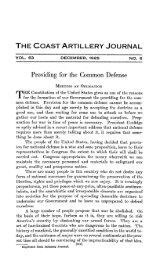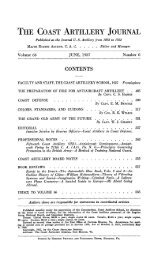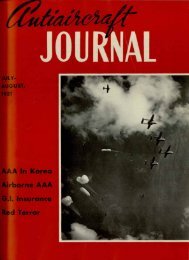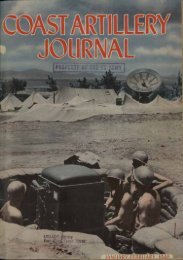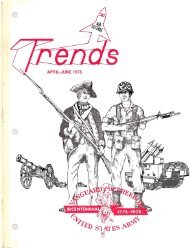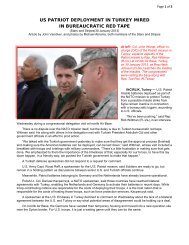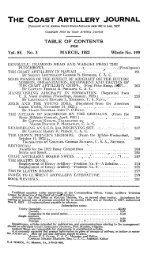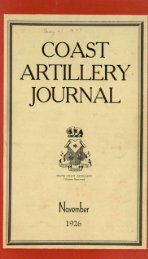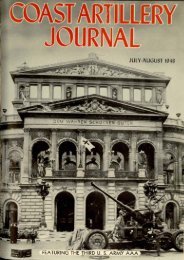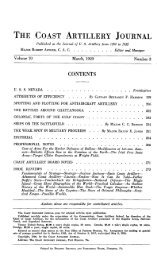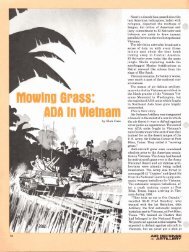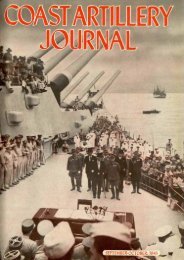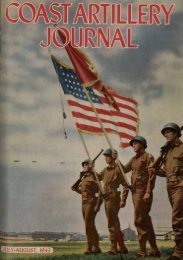COAST ARTILLERY, JOURNAL - Air Defense Artillery
COAST ARTILLERY, JOURNAL - Air Defense Artillery
COAST ARTILLERY, JOURNAL - Air Defense Artillery
You also want an ePaper? Increase the reach of your titles
YUMPU automatically turns print PDFs into web optimized ePapers that Google loves.
ADDRESS TO RESERVE OFFICERS 525<br />
serve Corps and in the Regular Army. Of two young men entering<br />
the military service at the age of twenty-one, it is possible for the one<br />
who goes into the Reserve Corps to attain the grade of major at the<br />
age of thirty-one, whereas the other probably would not attain the same<br />
grade in the regular service until the age of forty-eight. Similarly, the<br />
officer in the Reserve Corps might reach the grade of colonel at the<br />
age of thirty-nine, whereas the one in the regular service probably<br />
would not reach that grade until the age of sixty-one.<br />
Many reserve officershave expressed dissatisfaction at the present<br />
system of assignment and promotion. Figures indicate that collectively<br />
reserve officershave received more than a full share of rank. However,<br />
there undoubtedly exist many inequalities which justify a feeling of<br />
discrimination between individuals. Such inequalities were not entirely<br />
avoidable. The War Department did not wish to lose the valuable<br />
interest and services of the WorId War veterans, so proceeded with the<br />
organization of the Officers' Reserve Corps before completion of the<br />
initial mobilization plans which were essential to the ascertainment of<br />
requirements by grade in commissioned personnel.<br />
The assignment of reserve officers is closely connected with the<br />
question of promotion. Some assigned officers are unable to devote<br />
any time to military activities. This throws an additional burden on<br />
those other officerswho endeavor to maintain a high standard for their<br />
unit. A further difficulty lies in the fact that some surplus officersare<br />
attached to units and feel that such a position tends to unfavorable<br />
discrimination against them in the matter of promotion.<br />
We can not hope to undertake much advance in the scope of active<br />
training. Even were the appropriations to be made available, existing<br />
facilities would soon reach the limit of satisfactory utilization.<br />
Some improvements will be made in the method of apportionment of<br />
funds for training. We propose to institute a procedure which not only<br />
will give training to the maximum number of officers, but also will<br />
enable designation a sufficienttime in advance to permit full personal<br />
arrangements and other essential preparation.<br />
The Officers' Reserve Corps has reached a total that assures an<br />
adequate number of reserve officersfor the initial requirements of our<br />
mobilization plans. To my mind, there are four (lefinite ends to which<br />
we should now devote our attention with a view to improvement of the<br />
Organized Reserves. First, we may increase the value of active training.<br />
Experience has already brought progress in this respect, but we should<br />
continue thought and experiment with a view to securing the greatest<br />
possible benefit to reserw officers. Another objective is to make provision<br />
that actiw training becomes available to those officers through<br />
whom it will bring greatest benefit to the nation. Improvement of the


